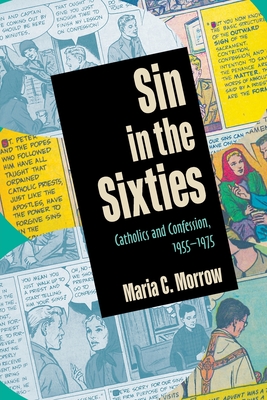Sin in the Sixties: Catholics and Confession, 1955-1975

Sin in the Sixties: Catholics and Confession, 1955-1975
Confession reached its peak attendance in the early 1950s, but by the end of the Second Vatican Council, the popularity of the sacrament plummeted. While this decline is often noted by historians, theologians, priests, and laity alike-all eager to provide possible explanations-little attention has been paid to another dramatic shift. Coincident with the decreasing popularity of the sacrament of penance in the United States were changes to non-sacramental penitential practices, including Lenten fasting, Ember Days, and the year-round Friday meat abstinence. American Catholics-sometimes derisively called Fisheaters-had assiduously observed Friday abstinence, regardless of ethnicity or geographic location. In 1966, the bishops in the United States released a statement implementing Pope Paul VI's apostolic constitution on penance. Eating meat on Friday transformed from being a mortal sin to not being regarded as sinful at all. This apparently overnight change to one of the most long-standing practices, one that could be used to identify Catholics in the U.S., confused many of the faithful and resulted in Fridays becoming just another day. The decline of the sacrament is best seen within the context of the decline of a larger penitential culture among American Catholics, and both are best understood in reference to the changing notion of sin at this time period. Sin became a more abstract, general concept, contrasting sharply with the actual and personal "shopping list" of sins that the faithful had frequently enumerated in earlier decades. Accompanying this change in the perception of sin were criticisms of the practice of penance, and both sacramental and non-sacramental penance were found wanting as both legalistic and superficial. The attempts to revitalize penance through greater choice-whether in the confessional or on Fridays-actually furthered the decline in American penitential practice. For some, penitential practices are the buried treasure of the church that await rediscovery. For others, they were experiences that had to be endured and that are best forgotten. Morrow, in a thoughtful, even-handed way, traces how the perception and emphasis changed during this critical and controversial time in the church's history.
PRP: 343.09 Lei
Acesta este Prețul Recomandat de Producător. Prețul de vânzare al produsului este afișat mai jos.
308.78Lei
308.78Lei
343.09 LeiIndisponibil
Descrierea produsului
Confession reached its peak attendance in the early 1950s, but by the end of the Second Vatican Council, the popularity of the sacrament plummeted. While this decline is often noted by historians, theologians, priests, and laity alike-all eager to provide possible explanations-little attention has been paid to another dramatic shift. Coincident with the decreasing popularity of the sacrament of penance in the United States were changes to non-sacramental penitential practices, including Lenten fasting, Ember Days, and the year-round Friday meat abstinence. American Catholics-sometimes derisively called Fisheaters-had assiduously observed Friday abstinence, regardless of ethnicity or geographic location. In 1966, the bishops in the United States released a statement implementing Pope Paul VI's apostolic constitution on penance. Eating meat on Friday transformed from being a mortal sin to not being regarded as sinful at all. This apparently overnight change to one of the most long-standing practices, one that could be used to identify Catholics in the U.S., confused many of the faithful and resulted in Fridays becoming just another day. The decline of the sacrament is best seen within the context of the decline of a larger penitential culture among American Catholics, and both are best understood in reference to the changing notion of sin at this time period. Sin became a more abstract, general concept, contrasting sharply with the actual and personal "shopping list" of sins that the faithful had frequently enumerated in earlier decades. Accompanying this change in the perception of sin were criticisms of the practice of penance, and both sacramental and non-sacramental penance were found wanting as both legalistic and superficial. The attempts to revitalize penance through greater choice-whether in the confessional or on Fridays-actually furthered the decline in American penitential practice. For some, penitential practices are the buried treasure of the church that await rediscovery. For others, they were experiences that had to be endured and that are best forgotten. Morrow, in a thoughtful, even-handed way, traces how the perception and emphasis changed during this critical and controversial time in the church's history.
Detaliile produsului









